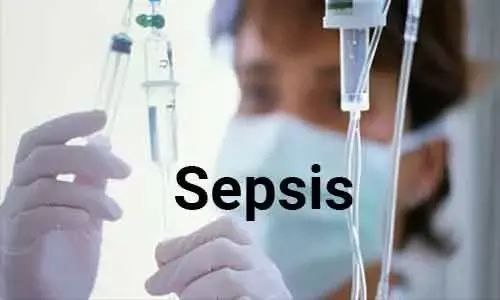- Home
- Medical news & Guidelines
- Anesthesiology
- Cardiology and CTVS
- Critical Care
- Dentistry
- Dermatology
- Diabetes and Endocrinology
- ENT
- Gastroenterology
- Medicine
- Nephrology
- Neurology
- Obstretics-Gynaecology
- Oncology
- Ophthalmology
- Orthopaedics
- Pediatrics-Neonatology
- Psychiatry
- Pulmonology
- Radiology
- Surgery
- Urology
- Laboratory Medicine
- Diet
- Nursing
- Paramedical
- Physiotherapy
- Health news
- Fact Check
- Bone Health Fact Check
- Brain Health Fact Check
- Cancer Related Fact Check
- Child Care Fact Check
- Dental and oral health fact check
- Diabetes and metabolic health fact check
- Diet and Nutrition Fact Check
- Eye and ENT Care Fact Check
- Fitness fact check
- Gut health fact check
- Heart health fact check
- Kidney health fact check
- Medical education fact check
- Men's health fact check
- Respiratory fact check
- Skin and hair care fact check
- Vaccine and Immunization fact check
- Women's health fact check
- AYUSH
- State News
- Andaman and Nicobar Islands
- Andhra Pradesh
- Arunachal Pradesh
- Assam
- Bihar
- Chandigarh
- Chattisgarh
- Dadra and Nagar Haveli
- Daman and Diu
- Delhi
- Goa
- Gujarat
- Haryana
- Himachal Pradesh
- Jammu & Kashmir
- Jharkhand
- Karnataka
- Kerala
- Ladakh
- Lakshadweep
- Madhya Pradesh
- Maharashtra
- Manipur
- Meghalaya
- Mizoram
- Nagaland
- Odisha
- Puducherry
- Punjab
- Rajasthan
- Sikkim
- Tamil Nadu
- Telangana
- Tripura
- Uttar Pradesh
- Uttrakhand
- West Bengal
- Medical Education
- Industry
How crucial is early Antibiotic treatment to prevent septic shock?

A recent study found out that any delays in the administration of the initial antibiotic in patients with a suspected infection are linked to an increased risk of septic shock. Furthermore, while the quick Sequential Organ Failure Assessment (qSOFA) score has a greater specificity for predicting septic shock than the systemic inflammatory response syndrome (SIRS) score, it is associated with a worse outcome, even when patients receive early antibiotics.
This study was conducted by Roshan Bisarya and team with the objective to see if the delay between presenting to the emergency room and receiving antibiotics linked to the development of septic shock in individuals with a suspected infection? The data of this work was published in CHEST Journal.
This was a cohort study that lasted from March 2007 to March 2020. All patients with a suspected infection who received their first antibiotic within 24 hours of triage were included. Patients who were in shock at the time of presentation were ruled out. The progression to septic shock was predicted using univariate and multivariate logistic regression models.
The key findings of this work were as follow:
1. The study involved seventy-four thousand one hundred fourteen patient contacts.
2. Five thousand five hundred ten patients (7.4%) had septic shock.
3. Antimicrobials were given to 88% of the patients who developed septic shock within the first 5 hours after triage.
4. Time (in hours) to initial antimicrobial therapy had an OR of 1.03 for progression to septic shock and 1.02 for in-hospital mortality in the multivariate logistic model.
5. When the severity of the disease was taken into account, each hour spent waiting for initial antimicrobial administration was linked to a 4.0% increase in septic shock progression for every 1 hour up to 24 hours from triage.
6. Antibiotics were provided to patients with positive qSOFA findings earlier than patients with positive SIRS scores (0.82 h vs 1.2 h; P.05).
7. Patients with positive qSOFA values at triage had a substantially quicker duration to septic shock (11.2 h) than patients with a positive SIRS score at triage (P.05) (26 h).
In conclusion, more sophisticated methods of early detection of infection, such as machine learning and artificial intelligence, are needed, especially for patients who seek care with fewer overt signs or symptoms [suggestive] of sepsis.
Reference:
Bisarya R, Song X, Salle J, Liu M, Patel A, Simpson SQ. Antibiotic timing and progression to septic shock among patients in the ED with suspected infection. Chest. 2022;161(1):112-120. doi:10.1016/j.chest.2021.06.029
Medical Dialogues consists of a team of passionate medical/scientific writers, led by doctors and healthcare researchers. Our team efforts to bring you updated and timely news about the important happenings of the medical and healthcare sector. Our editorial team can be reached at editorial@medicaldialogues.in.
Dr Kamal Kant Kohli-MBBS, DTCD- a chest specialist with more than 30 years of practice and a flair for writing clinical articles, Dr Kamal Kant Kohli joined Medical Dialogues as a Chief Editor of Medical News. Besides writing articles, as an editor, he proofreads and verifies all the medical content published on Medical Dialogues including those coming from journals, studies,medical conferences,guidelines etc. Email: drkohli@medicaldialogues.in. Contact no. 011-43720751


